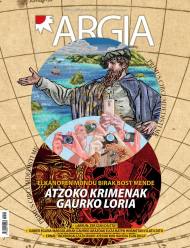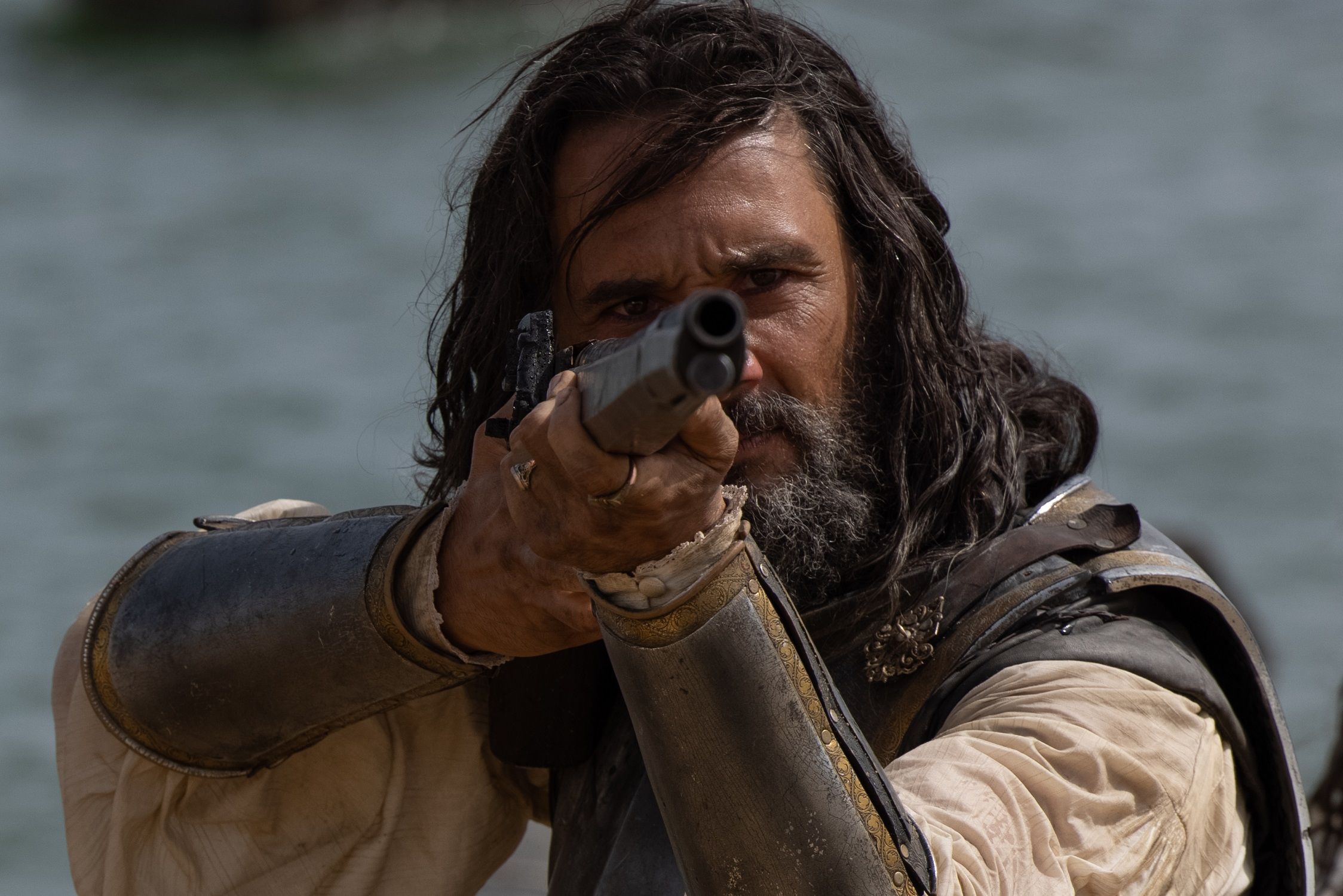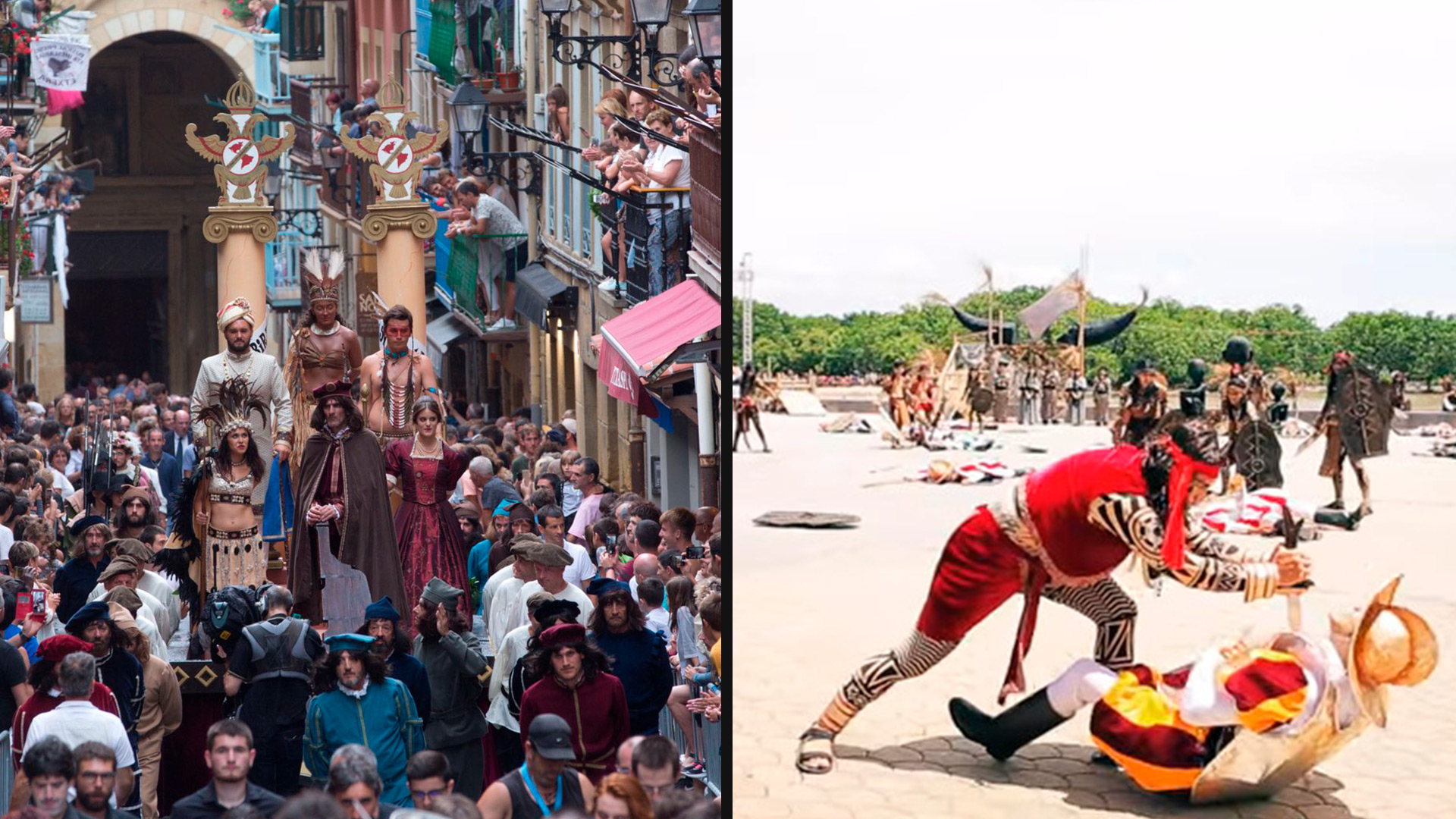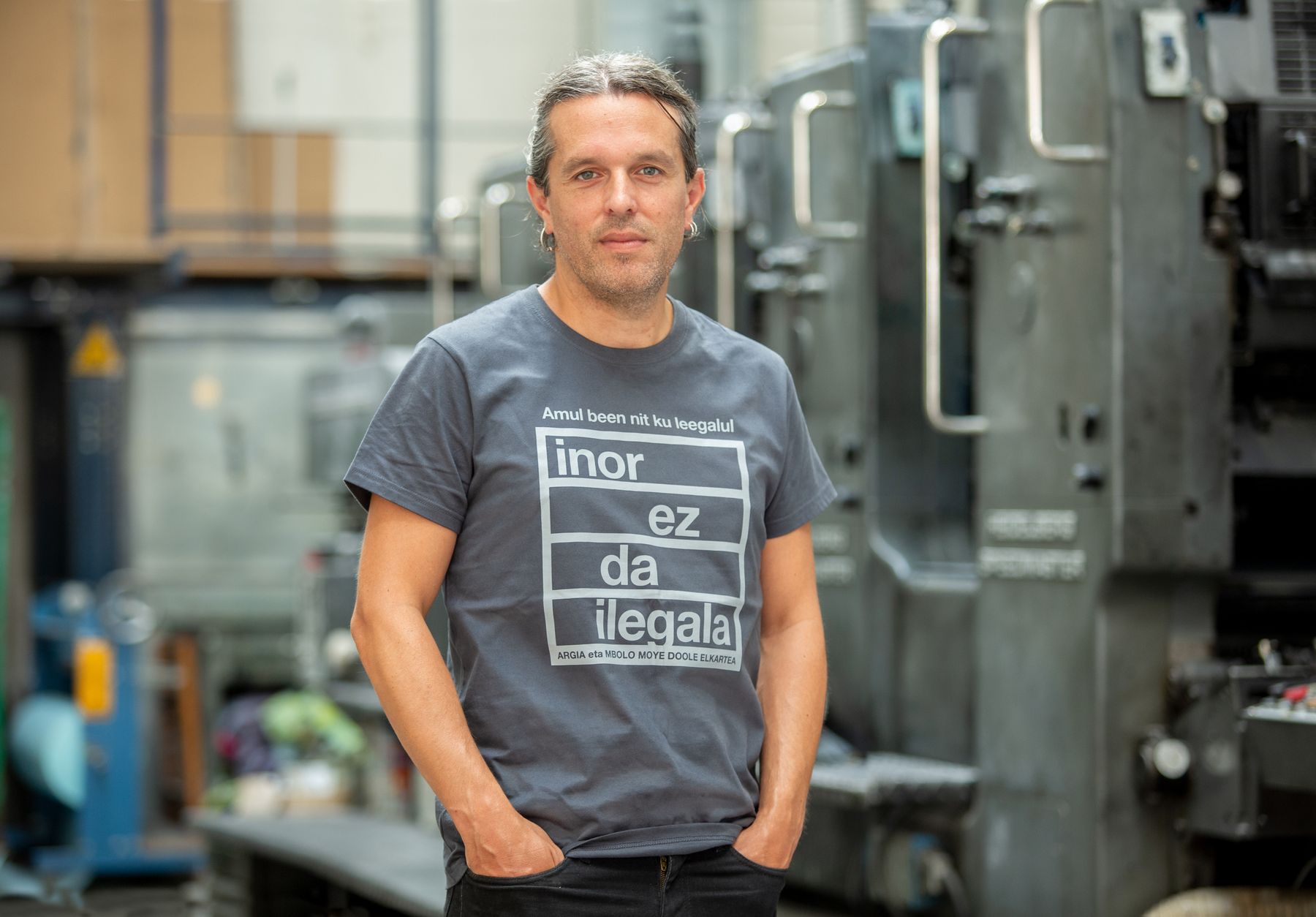What do we have to celebrate? What do they have to hide?
- On the net we will only find glorious words around Juan Sebastián Elcano. The Spanish pages will remind us of the contribution to the world to globalisation and the opening of new trade channels. In the Basque ones, among the calls to restaurants, txakoli and tourism, there will appear a fetish that intends to recognize that the Basques were the best in the world at sea. They all stress that he was the first to turn the world around. V Back to the World The machinery of the Centenary already has the brand Elkano ready. But since history is never neutral, like journalism, what do you store to sell?
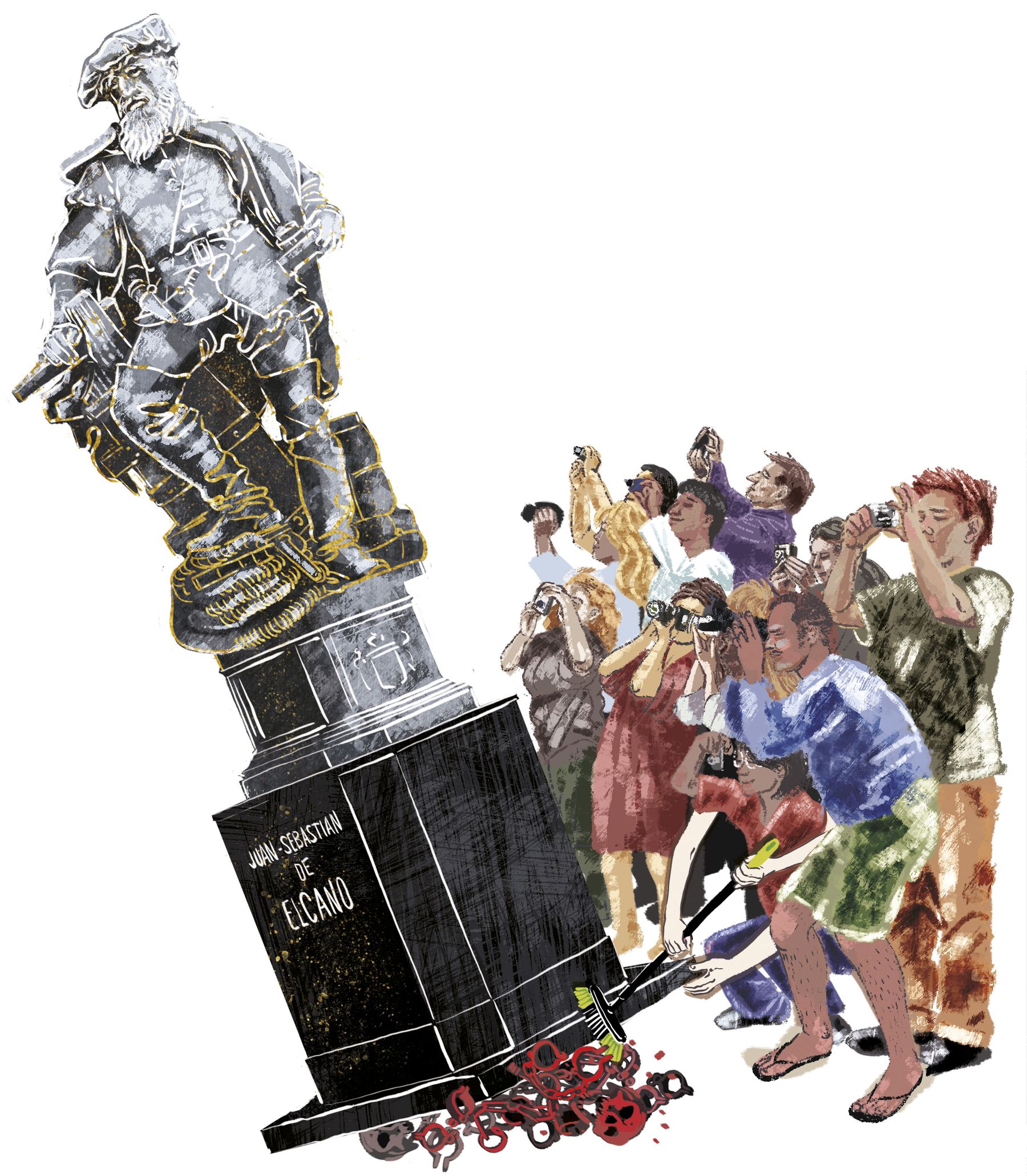
Plazuela in front of Getaria City Hall. Wednesday, 08:20. Four cats on the street. I approached the second person who photographed the state in front of me and asked him: “Excuse me, do you know what that is?” “No idea, but I like the photo”, the Australian tourist arriving from San Sebastian to the hometown of Juan Sebastián Elcano. In Euskal Herria we know little about Elkano, what will we ask those who come to visit us? Mayor Nikanor Lertxundi (EH Bildu) says that this ignorance is widespread: “There is a lot of ignorance, there are big stereotypes, both inside and outside Getaria. Elkano is known for turning the world around, but it’s almost the only thing we know.” And, to be honest, that is also at issue for some. For example, the return to the world that Magellan began in 1519 and that Elkano made in 1522 was not the first in history. 100 years earlier, between 1421 and 1423, members of the Chinese Emperor Zhu di's maritime expedition were the first to demonstrate the roundness of the world.
Instead of putting the medal on the chest, one thing is certain: by 2022 we will listen, read and see about Elkano as we had never done. With the aim of commemorating the fifth centenary of the return to the world, we have begun to prepare speeches, products and initiatives promoted by Spanish and local institutions. The Elkano brand is going to expand at home and in the world, starting from its own political, economic interests and its own way of understanding the world.
Biography of Elcano

“The expedition of Elcano was an extraordinary feat of the Spanish Army” are words of the
King of Spain, at the V Congress of Elkano. The declarations of support for the Centenary go back to the event held in January at the Zarzuela in Madrid. Elcano is a character who has always helped Spanish nationalism and the Franco dictatorship. As they do with all the elements that suggest the greatness of the then Spanish Empire. From this point of view alone, the Spanish Government can understand the V Congress of Elkano. That the organization of the centenary has been entrusted to the Ministry of Defence in cooperation with the Department of Culture. Donostiarra MP Odón Elorza presented on his blog in November 2017 the political objectives of the brand Elcano that have begun to boost: “We have to trace this important episode of the common history of the peoples of Spain. It is highly advisable to remember that the Basques were the most leading players in this collective venture promoted by the Crown of Spain and, in general, in the maritime (military) campaigns of the Kingdom of Spain”.
The Government of Spain has declared the centenary an “exceptional public interest” and has offered tax incentives and benefits of up to 90% to associations and companies that organise or disseminate actions on the global tour. One of the first projects to sell Elkano's exploits to the world is underway: The film Without Limits, with a budget of 25 million euros, is directed by English Simon West and has the collaboration of superproductions such as The Hobbit or Game of Thrones. In the words of the Japanese producer Miguel Menéndez de Zubilwaukee, “Elkano is the purest conqueror of Spain, because it has no negative aspects. He didn't do anything wrong, he was a discoverer, he's an outsider hero, like Blas de Lezo and Don Pelayo. We are not going to do historical work, it is going to be an adventure and action movie.”
At the same time, Andalusia and the Basque Autonomous Community have set up their own initiatives with the aim of tackling the centenary.

Photo: Irekia - Basque Government
“Elkano represents what we were and what we are the Basques”
‘Mundu bira 500: Elkano Fundazioa’ was created in July last year and has been working since then. The Board consists of: The Minister for Industry of the Basque Government, Arantxa Tapia, the Minister for Culture, Bingen Zupiria, the Deputy General of Gipuzkoa, Markel Olano, and the Minister for Culture and Tourism of Gipuzkoa, Denis Itxaso, the President of the Mancomunidad de Urola Kosta, Igor The Foundation currently has a single employee, Ion Irurzun, who works as director and has previously participated in the Gipuzkoa Berritzen project.
In Irurzun’s words, the foundation will focus on the fund accounts of 500 years ago. For example, “90% of the boats were made here or the prestige that Basque seamen have had around the world; the Basques want to work and expand our relationship with the maritime culture and that of Elkano is a milestone, a brand”. Encouraging research, knowing more about Elkano, says that one of his great challenges will be “without prejudice”. For this purpose, as indicated in the presentation of the foundation, “the objective will be the cultural, touristic, industrial, commercial and educational promotion, valuing the feat of the sailors of Getaria”.
Xabier Alberdi: "I see Elkano as an exceptional entrepreneur, as a president of Adegi, who has a great talent. An José Luis Korta who thinks and says what needs to be done to achieve success in some way."
Xabier Alberdi is one of the main authors and disseminators of the history and discourse that the Foundation has made. He is scientific director of the Naval Museum of Donostia-San Sebastián and head of research of the Albaola de Pasaia factory. Albaola has become known for the informative work that the Basques have done in recent years on the extraordinary importance we have had in the world in marine culture and in its technological development. Juan Sebastián Elcano has also been included in this speech by Alberdi and the Mundu Bira Foundation as a symbol of the maritime feats of the Basque men of that time. In the interview offered to Deia in July 2017, Elkano defined it as follows: “I see a great strategist, as an independent entrepreneur, as a president of Adegi. A man of action with a sense of adventure. An José Luis Korta who, in a way, thinks and says what needs to be done to achieve success. We are not aware of the size of what Elkano did and also the Basques do not know how to sell us.” Asked about the importance of the centenary of the return to the world, Alberdi said in Diario Vasco 2016: “Developed nations have a prestigious policy. If a people wants to do business abroad, it is not the same to be a prestigious people as to be an unknown people.” As a sign of this Alberdi wager, Albaola has been commissioned to make a replica of the nao Victoria de Elkano, endorsed by the Provincial Council of Gipuzkoa and the Municipalities of Pasaia and Getaria.
But in this epic story, Elkano has “a particularity.” One thing is the ability that the Basques developed to reach remote territories by sea and the rise of industry, because they were killed almost to put an end to the Cantabrian whales. But it is very different to want to become ambassadors of the Basques and Basques, faithful worker of one of the most influential empires that culture and people bled to death.
Marketing will hardly conceal its contradictions. For example, in February, Aitzol Azurtza, a member of the Basque diaspora, said in Berria: “For the Basques Elkano may be the model of a brave adventurous hero, but those of us who live in the diaspora cannot have Elkano as a model, because of his Spanish conqueror.” He complained that the Basque Government had chosen 8 September, the date on which Elcano and the other sailors arrived in Seville, to celebrate Basque Diaspora Day.

Photo: Irekia - Basque Government
This idyllic version of Elkano, far from war and
conquest, has been acquired by the entire political class, with the support of EH Bildu to the PP. In 2015, the Basque Parliament unanimously approved that the public institutions of the CAV gave strategic importance to the centenary and took advantage of the figure of Elkano to open Euskal Herria to the world. In the text adopted, as well as in the speeches by the parties, there is no critical reference to Elkano’s performance in the service of the Spanish Empire. The PNV, the PSE-EE, EH Bildu, pp and UPyD have joined the initiative in the Upper House. 73 in favour, 73 in favour. An unparalleled political consensus on those dark times in which so much debate is still ongoing today.
Getaria’s historian, Miguel Jiménez, has been critical of the “eurocentrism that emanates the official message”. “They always mention what good browsers they were and what great skills they had. But all non-European white men, like the indigenous masses and women, become secondary in the best cases and anonymous in most cases. Before and now.”
This idyllic version of Elkano, far from war and conquest, has been assumed by public institutions, with the support of EH Bildu al pp.
Getaria historian Idoia Arrieta is ashamed of her performance when they claim that the context in which they occurred 500 years ago was different. “Today they forget that the context exists, wars are everywhere and we are not all warring, we are not all going to kill people across the world for the benefit of the economic and political interests of the powerful. Will we also justify the Civil War? Will we also have to understand the abduction of several women as sexual slaves on the boat? Where is the limit?” According to Jiménez, only those carried out then can be considered normal according to a conquering mentality, “now the same mental scheme is being repeated that then, say that Elkano and company contributed to globalization and development. Ask, for example, for the development that the West has led to the indigenous peoples of Patagonia.”
Elcano is not Agirre, Cortes or Pizarro, to create an
independent account of war and violence, they have linked the objectives of Elkano's journey with trade. But there are significant data that cast doubt on it. On the one hand, the equipment with which the trip was carried out. “The Magellanic Run and the one used by Hernán Cortés, who was a genocidal conqueror that no one doubts,” explains Arrieta. Let us review what was loaded on the five boats of Magellan and Elkano, because there are concrete facts about it. In addition to food and sea utensils for two years, knives to “seduce the indigenous”, mirrors, scissors, combs, scarves and collars. And by the time these tricks don't work: 110 pieces of artillery, guns, falcons, shells, gunpowder, 50 shotguns, 60 whales, 1000 lances, 360 dozens of oxen, 95 dozens of darts and other war instruments and weapons.
On the other hand, the Catholic Monarchs constituted the House of Hiring of the Indies to control the commercial monopoly of the American colonies, through which they linked the expedition of Elkano. He set a specific goal for seafarers: to bring “new plants, animals and humans” found along the way.
And finally, Carlos V. The capitulations, characteristics of the contract agreed by the King with Magellan, are very significant. Thus, on the journey, “the heads of the expedition will be the governors of the conquered and ‘advanced’ lands.” It's a regular reward in the military campaigns back then. “The subordination of the new territories to the king is called colonization. The goal of Elcano’s expedition was not just trade, clearly,” says Idoia Arrieta.

History, prêt-à-porter in
1992, on the fifth centenary of Christopher Columbus’s journey, the Government of Spain celebrated the “Discovery of America” and not the Conquest of America. It's no coincidence. It is an example of how to use the past for the benefit of political, economic, ethical or aesthetic interests. The centenary was used to make a vision of the world in particular and, as it was then clear, to make a round business to transfer public money to private hands.
Idoia Arrieta understands history as a living inner vision, and that is why “those who have a future project will always try to adapt the vision of the past to it.” But if you want to gain fame or gain, you can't stop following the closest main line to power. For this reason, he has considered that Elcano may be important to some because “he reinforced the relationship between continents” or “he created commercial networks”, but “what I see is destruction, conquest and violation. If we want to imagine a better world, Elkano is not a benchmark for me.”
Idoia Arrieta "I see destruction, conquest and rape. If we want to imagine a better world, Elkano is not a benchmark."
The main historiographies have focused on empires, states and the accumulation of wealth. We Basques have not written our history either. It is one of the consequences of being subjected for many years to other empires and states. The land and the authorities that have exploited it have been our mirrors written by us. In recent years, however, attempts to rewrite our history are multiplying, some of which are working from other perspectives, reclaiming those punished by forgetting official stories. But the main messages that are focusing on Elkano, whether it be the Spanish supremacist version or the Basque heroic version, do not seem to be going down that road.
It's not about blaming what they did about 500 years ago in 2018. It's not a regret. The question is why we should now take advantage of what has happened in the past. That is, for many, the main function of history: a place to build a just, inclusive and supportive future, a mirror to learn and improve oneself. If no one is to be excluded on this road, it is inevitable that the decolonial exercise will be present. Halving the pairs of official history, giving voice to women, to the people of origin and to those who have suffered the damage of the “Discovery of the New World” to the present day.
Two friends offered a small rap performance in the plaza and musutruk, after a simple popular meal. With a song, we were reminded that a neighbor, a young man, recently passed away. Money had to be raised to return the body to its hometown. Oh, that mother of mine! Your child's... [+]
Unconscious day-to-day exercise has become a topic during your stay in the Basque Country. I haven't been there for many days and I've been squeezing my breath several times... I'm an observer trying to find and rediscover my people. If I didn’t want to see things before or if... [+]







